- Home
- William Kowalski
Just Gone Page 5
Just Gone Read online
Page 5
But it was hard, sometimes, not knowing if I made a difference. Every time I read about another shooting, another death by drugs, another innocent child hurt or killed, I wondered if anything I did mattered.
Now I understood that many of these people had come through my shelter. They would have heard the story of Jacky Wacky as it was passed from one child to another. They would have known that it was not just a story.
And they had survived their challenges. They had come out the other side stronger for what they had been through.
I had made a difference. I was just one old woman in a big cold city. But I was part of something bigger too. That day was all the proof I needed.
CHAPTER THIRTEEN
Little by little, I began to feel strong again. The doctor told me the surgery was a success. The sickness was gone from my body. It might come back someday, he said. None of us live forever. He told me to take it easy.
But I knew better. I had made a promise to the higher power that if I was given any more time on this earth, I would continue to work for the children.
And that’s just what I do. The shelter was rebuilt soon after the fire and I go back every day. No sitting around the apartment for me. I am needed. I comfort the women who are hurt, and I feed the children who are hungry.
I have a new helper too. Sergeant Kosinski is not a sergeant anymore. He retired from the police force. Now he’s just plain old Tom. And he is here every morning, rain or shine, ready to help. Retirement is no good for someone like him, he says. He has to keep busy, or he’ll just get old.
Tom is a lot like me. He never had time to get married or raise a family of his own. His work always came first. He chose a different path in life from mine. He decided the best way to fight the good fight was on the street. But we both ended up in the same place. There are many paths, but there is only one way.
“You ought to feel lucky,” I tell him. “We don’t usually allow men in here. Just the good ones.”
Tom is sitting on the floor. He has a kid on his lap, and there are several more sitting around him. He’s reading to them from a book. He knows I’m just teasing him. Now that he doesn’t wear his uniform anymore, his sense of humor is stronger. He looks up at me and smiles.
“I do feel lucky,” he says.
Sometimes the kids gather in the play area. I can hear them telling stories to each other. The story of Jacky Wacky is one of their favorites.
After all this time, the story has changed little by little, as stories do. Sometimes Jacky Wacky drives a big truck, and he uses it to take all the gangbangers away to jail. Other times he runs a restaurant where kids can go and eat anything they want— ice cream, roasted chicken, hamburgers and french fries. All free.
One thing hasn’t changed though. Jacky Wacky still wears raggedy clothes and a big floppy hat. He still carries two suitcases, one black and one white. And he still punishes the adults who are bad to children.
Tom shakes his head at this.
“Where do they come up with these stories?” he asks me.
“Children will be children,” I say. “They live in a scary world. They have to find some way to make sense of it.”
“If only there really was a Jacky Wacky,” Tom says. “It would have made my job a lot easier.”
“There’s always some truth to every story,” I tell him. I know better than to say too much about what I know to be real. Tom is still a practical, no-nonsense man.
I could tell him that his job might have been a lot harder if Jacky Wacky wasn’t real. We never know how things might have been different. We only know the way they are.
But I don’t want to confuse him.
“You should let me walk you home later, Mother,” Tom says. “It’s not safe, you wandering the streets at night.”
“No, thank you,” I say. “I can take care of myself, thank you very much.”
“I never said you couldn’t,” Tom says. “I’m just saying you might be safer with me.”
“So you can play the hero?” I say. “What are you gonna do? Beat up anyone who crosses my path?”
“I still got it,” Tom says, flexing his arm and winking.
“Listen to you two,” says Linda Mae. “You sound just like an old married couple.”
“Now that’ll be the day,” I say.
And Tom just laughs.
CHAPTER FOURTEEN
Fact is, sometimes I am scared to walk home by myself. But I am used to living with fear. And one of the ways I stay strong is to never give in.
This city is just as dangerous as it ever was. Boys still join gangs before they’re old enough to shave. Girls still get pregnant when they are practically babies themselves.
The leaders of this city keep making promises. They say things will get better if only we give them power. Then they get elected, and nothing changes. If anything, things have gotten worse. I don’t blame the politicians for causing the crime. But crime comes from poverty, and no one has done anything about that.
I like to think that the sight of a little old lady walking by herself at night gives some people strength. Maybe someone looks at me and thinks, if she’s not afraid, then neither am I.
Sometimes the best way to teach people is by example. All these politicians with their promises still don’t understand one thing: if the mothers and children of the world are safe, then everyone is safe. It all starts there. I would like to see them quit making their fancy speeches and come on down to my shelter. I would like to see them sit with the kids on their laps and read them a book. Better yet, I would like to feed these politicians a baloney sandwich and a bag of chips. What if I told them that was all they were allowed to eat that day? Would they understand then?
It’s the end of another day at the shelter. I let Linda Mae work nights, because I still get tired easily. I don’t think that will change as I get older. But I feel stronger than I did when the sickness was inside me.
I’m walking home down a dark street. Half the streetlights still aren’t working.
My eyesight has gotten worse. Up ahead, I see several dark shapes. That doesn’t scare me—everything looks like a dark shape these days. But I can smell danger. I straighten my back and hold my head high. I grab my purse and hold it close.
The dark shapes stop. They make a circle around me.
“Let’s see what you got in that purse, old lady!” one of them says.
I feel strong young hands trying to rip it away from me. Too late, I think maybe I should have taken Tom up on his offer.
“Stop it, you boys!” I say.
I hear the sound of a knife being flicked open. My purse strap is cut.
“You ought to be ashamed of yourselves,” I say. I feel close to tears. I still can’t see their faces. They wear hoods that hang down in front, so I can’t identify them.
Then something changes. I can’t say what it is. The air feels different. Someone else is here.
They all stop and look around.
“Who’s that?” one of them asks.
I look around too.
He’s appeared out of nowhere. I can’t see him very well, but I recognize his outline. He wears a big floppy hat. He’s carrying what looks like two suitcases. He sets them down slowly on the sidewalk. Then he stares at the young men who surround me.
“What you got in them bags?” one of young men says. He’s trying to sound brave, but I can tell he’s scared.
I begin to laugh.
“What’s in those bags is your destiny,” I tell them. “It’s your future. You can choose right now. But if he opens up that black one, you boys are in trouble.”
The next thing I hear is the pounding of feet on pavement. They’ve run away.
Now it’s just me and him. As we stand there, a streetlight flickers on overhead. A pool of light spills down and catches us both. His face is still hidden, but I can tell he’s looking at me.
“I’ve been waiting a long time to meet you,” I say.
He doesn
’t say anything.
“You know who I am?” I ask.
He remains silent.
“Maybe it’s my time,” I say. “Maybe you’re the Angel of Death. You gonna open up that black suitcase for me? Is it time for me to go?”
Slowly he bends down and picks up his suitcases. He turns and begins to walk away. So tonight is not my night.
“M’kwon,” I call after him.
He stops. He doesn’t turn around. He just waits.
“I knew your uncle, Jamal,” I say. “I knew him when he was just a little boy.”
Nothing. I’m looking at his back.
“So I was right,” I say. “It gets passed down from one to the next, doesn’t it? Not father to son. Man to boy. You’re out there looking for the next one, right?”
He turns and looks at me. I can just see the outline of his face in the light.
“How do you do it, boy?” I ask him. “What’s the secret of your power? That’s the thing I’ve always wanted to know. How do you know where to be? How do you make it happen?”
There’s still no answer. He looks up for a moment into the night sky. I follow his gaze. There’s nothing to see. The lights of the city reflect off the clouds. From here they look like the belly of some great beast hovering over all of us.
When I look down again, he’s gone.
So it is not for me to know. That’s okay. I can live with that. I think I had my answer anyway.
I keep on toward home.
I have never felt alone. Maybe that’s because my faith kept me strong. Or maybe it’s because the man in the floppy hat was with me all these years, and I didn’t even know it.
It’s late, and I’m tired. But I make myself a cup of tea before I go to bed. Then I lie down and wait for sleep to come.
The one thing about dying that always bothered me before was that the children would be left alone. There would be no one left to look after them.
But I can see now that that isn’t true. He’s out there, fighting the good fight. Doing the right thing. He is not just a man. He’s a force of nature. So there is some good in the world.
When I am gone, the fight will continue.
There’s at least one man out there who will make sure it never stops.
WILLIAM KOWALSKI’s first novel, Eddie’s Bastard, was an international bestseller and has been translated into a dozen languages. Just Gone is his fourth title in the Rapid Reads series. Kowalski is a full-time writer, husband and father. He is also a part-time independent adult educational consultant, specializing in designing and delivering curricula to adults who are unemployed, undereducated and struggling to survive. He lives in Nova Scotia.
The following is an excerpt from
another exciting Rapid Reads novel,
Something Noble by William Kowalski.
Why did I think this would work?
I can’t just approach a total stranger and ask him for a kidney. It’s insane.
When Linda learns that her son Dre needs a kidney transplant, her family’s already shaky financial situation takes a turn for the worse. But when she discovers that the only one who can really help Dre is his half brother LeVon, a drug-dealing gangbanger, money is suddenly the least of her problems.
CHAPTER ONE
I just want to tell you straight up that this story has no happy ending.
But it doesn’t have a sad ending either. It’s a story about being a mom, so it has a lot of happy and sad in it. Like motherhood itself, it has no ending at all.
That’s because you never stop being a mom. You don’t stop when your kids go to sleep at night. You don’t stop when they grow up and move away. Being a mom is not just a job. It’s an identity. Maybe you already know what I’m talking about.
If not, you will by the time you’re done hearing my story.
My life has never been boring. I’m not an important or exciting person, but sometimes some pretty wild things happen to me. Usually they don’t come right on top of each other like this though.
This is the story of one remarkable year that was full of one wild thing after another. It was a year that changed my life and the lives of everyone I cared about. And it starts in my least favorite place of all: a doctor’s office.
Let me take you back to that doctor’s office right now.
My son, Dre, is sixteen years old. He’s been feeling sick for a while. We’ve been having a lot of tests done. Now we’re sitting and waiting for the doctor to come talk to us.
Dre feels too sick to be nervous, so I’m nervous for both of us. He lies on the exam table with his arm over his eyes. He’s so tall that his feet hang way down off the end of the table. I still can’t believe how big my baby is. I carried him on my hip for so long sometimes I can still feel him there. Now look at him. He’s a giant with dreadlocks. So handsome the girls can’t take their eyes off him.
I was only sixteen myself when I had Dre. I try to imagine him becoming a father at this age. It’s a horrible thought. I didn’t know a damn thing when I was sixteen. For the millionth time, I think about how amazing it is that we even survived. I was so stupid when I was that age. So young and stupid.
But here we are. We made it through a lot of bad times. Only now my baby is sick, and I have this horrible feeling that more bad times are around the corner.
When I get nervous, I talk. So I keep on chattering away to Dre, even though he isn’t answering me.
After a while he says, “Mama, give it a rest. I’m too sick for small talk.”
So we sit and wait in silence.
Finally the door opens. A new doctor walks in. He stops and looks at Dre, then at me. Then he looks at his chart, like he’s making sure he has the right people. We get that a lot. That’s what it’s like when your kid’s skin is a different color from yours. I guess people wonder if you’re just borrowing him or something.
“Señora Gonzalez,” says the doctor. “Buenos días. Me llamo Doctor Wendell.”
I get that a lot too. People think I don’t speak English just because I look Latina. I don’t even get mad anymore. I don’t have the energy.
“Hi,” I say. “How you doing, Doctor Wendell.”
“Fine,” says the doctor, without missing a beat. And I realize he wasn’t being rude. We live in a big city. He must meet a lot of people who don’t speak English. So maybe he’s not so bad after all. He closes the door.
“Let’s talk about Dre,” he says. He pronounces it Dree.
“It’s pronounced Dray,” I say.
“Sorry,” says the doctor. “I know you weren’t expecting to meet a new doctor today. So let me tell you about myself. I’m a kidney specialist. I was called in because of the results of Dre’s tests. I think the reason Dre feels so sick all the time is because he might have kidney problems.”
I nod. I knew it was going to be something serious.
“What kind of problems?” I ask.
“Well, the job of your kidneys is to clean the impurities out of your blood. If they can’t do that, your blood gets dirtier and dirtier. It’s like you’re being poisoned.
So what’s going on here is that Dre’s kidneys need some help doing their job.”
Dr. Wendell puts down the clipboard and waits for me to talk. It used to be that doctors never had time for us. We were just one more poor family of color. I used to hate it. It made me feel like our lives were unimportant to them. But now they are spending more and more time with us. They look at us in a new way now. And even though it sounds crazy, I hate this even more. It shows how serious Dre’s case is. I almost miss the days when we weren’t worth paying attention to. At least then nothing was really wrong.
I look at Dre. He hasn’t moved. I grab his toe and wiggle his foot.
“Well, baby,” I say, “at least now we know what the problem is.”
“Mmm,” says Dre. That’s the sound he always makes when he’s sick. I can tell he feels horrible.
“Is it one kidney or both?” I ask.
; “I’ll need to run some more tests to be sure,” says Dr. Wendell. “The nurse will take your blood, Dre.”
“Mmm,” says Dre again. He’s so sick he doesn’t even complain about one more needle. The nurse comes in again and draws another vial of blood. Dr. Wendell promises to call us as soon as he gets the results. Then I help Dre out to the car, and we head home.
“What time is it?” he asks.
“Three o’clock,” I say. “Why?”
“Because I gotta go do my paper routes.”
“Uh-uh,” I say. “No way. You’re gonna have to give those up. The doctor said you gotta rest.”
“But, Mama,” says Dre. “What about the money?”
Dre makes about three hundred bucks a month from his two paper routes.
It might not sound like much, but it makes a big difference to us. Yet our neighborhood is getting worse and worse. I won’t be sorry to see him stop walking the streets by himself.
I got mugged last year right in front of my own house. Broad daylight. He pointed a knife at me and everything. I didn’t get hurt, but I was scared to death. And he took the twenty bucks I had on me. That was twenty bucks I could not afford to lose.
I would move to a safer neighborhood, but moving costs money. Right now I’m just keeping it together financially. I’m mostly unemployed. I only have one job, as opposed to my usual three or four. We have enough to eat and pay the rent. But I’m just one flat tire or one speeding ticket away from being bankrupt. And the house is mine. I’m not giving it up just because punks have taken over the east side of the city. They’ll have to kill me first.
“Forget about the money,” I say. “We’ll figure something out.”
“But what?” Dre says.
“I dunno,” I say. “You’re too young to worry about these things.”
“No, I’m not,” he says. “You were my age when you had me.”
“Let me worry about money. That’s my job. You just take care of yourself. That’s all that matters.”
“I’m not all that matters. There’s Marco too,” says Dre quietly.

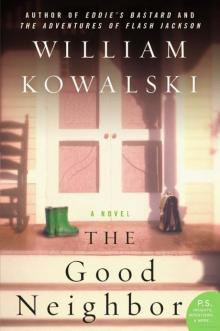 The Good Neighbor
The Good Neighbor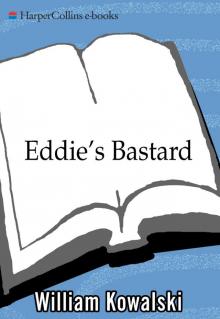 Eddie's Bastard
Eddie's Bastard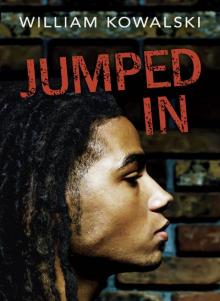 Jumped In
Jumped In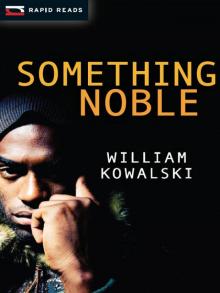 Something Noble
Something Noble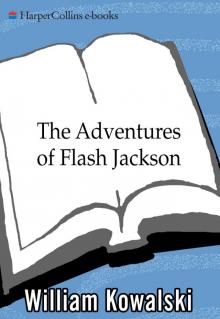 The Adventures of Flash Jackson
The Adventures of Flash Jackson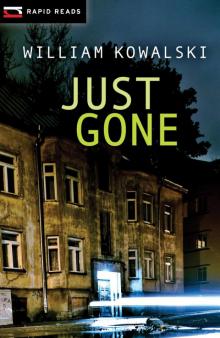 Just Gone
Just Gone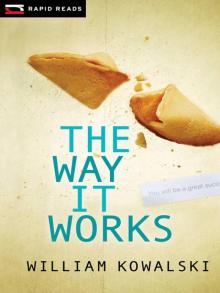 The Way It Works
The Way It Works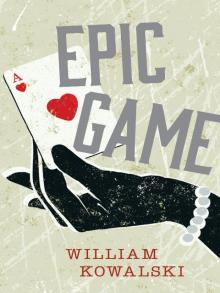 Epic Game
Epic Game